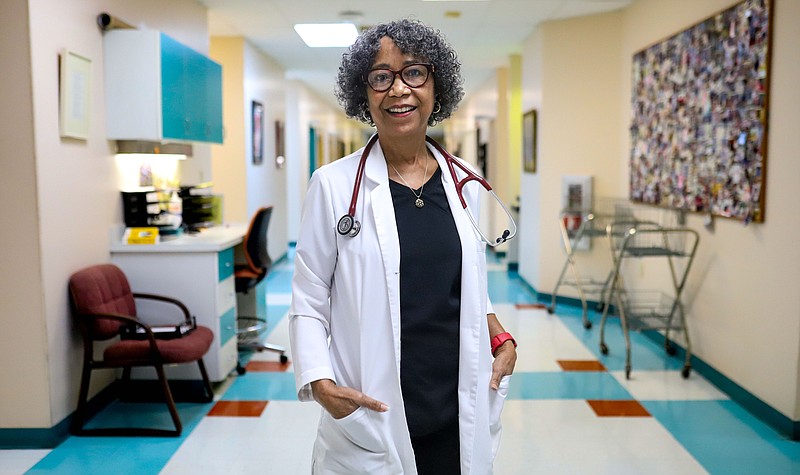As a pediatrician, Dr. Willie Mae Hubbard helps give children a healthy start in life. But nine years ago, she was in a situation where she needed someone to give a portion of themselves to save her own life.
Hubbard has an autoimmune disease that slowly destroys her liver. Although she had gotten along OK for decades, her liver reached the point of failure, and her only hope for survival was a transplant.
She was placed on the organ recipient list, but it took two years before she reached the top of the list and became eligible. Even then, there were no available donors that were compatible with Hubbard.
"I was really near the end, did not think that person would come, and my children had agreed to be live donors," Hubbard said in an interview, noting the liver is one of the organs that a living donor can contribute, in which case the donor gives a portion of their liver to the recipient.
"One week before the procedure, I actually got the call that I had a perfect match," Hubbard said.
While there's still a long way to go toward reducing the wait for organ recipients, organ availability has improved in the nine years since Hubbard underwent her transplant.
Photo Gallery
As Tennessee sees record organ transplants, Chattanooga doctor encourages more donors to sign up
A record 46,632 organ transplants were performed in the United States in 2023, representing an 8.7% increase over 2022, according to data from the Health Resources and Services Administration.
Tennessee also saw a record year for organ donation and transplantation in 2023.
Tennessee Donor Services, which handles organ procurement and donation for the majority of the state — including all counties in Southeast Tennessee — honored the decisions of 506 organ donors and facilitated 1,369 life-saving transplants, according to data from the organization.
Dawn Benjamin, a spokesperson for Tennessee Donor Services, said 2023's totals represent a 14% increase in organs donated and 21% increase in organs transplanted over 2022.
"So we are making progress, and I just think that one reason is that we have so many people who have a connection to donation and transplantation," Benjamin said in an interview.
Nearly a decade since her transplant, Hubbard is doing well and makes it a point to talk about the importance of organ donation, particularly among minority communities.
While shared ethnicity is not a requirement for matching organ donors and recipients, a more diverse donor registry increases the likelihood that people on the transplant list will be able to find a good donor match, according to the Health Resources and Services Administration.
Black people make up 13.6% of the U.S. population yet account for 27.8% of patients on the waitlist for an organ transplant, according to administration.
Hubbard said that's partly because Black people and other minority groups experience higher rates of diseases that increase one's risk of needing an organ transplant.
"Before you even get to the transplant list, there is such a high prevalence of comorbidities — such as diabetes, hypertension, obesity, hepatitis C — that are much more prevalent and advanced in the minority community, which disproportionately increases our rates of needing a transplant," Hubbard said.
There are numerous social factors, such as limited access to healthy food, medical care and other resources, that may lead people of color to wait until their disease is further progressed before seeking care.
"A lot of times, it is those social determinants that result in our numbers being higher on the transplant list anyway," she said.
(READ MORE: Tennessee father promotes organ donation after losing son)
At the same time, fewer people from racial minority groups register to become organ donors and thus represent a small portion of the donor pool.
Out of Tennessee's 506 donated organs from 2023, 421 came from non-Hispanic white donors, 52 from Black donors, 28 from Hispanic donors, three from Asian donors and two from multiracial donors, according to Tennessee Donor Services data.
Compounding the issue, Hubbard said, is that minority groups often distrust the health care system due to systematic racism and past trauma, such as the infamous Tuskegee experiment — where 600 Black men were unknowingly used as test subjects to study the progression of syphilis.
"The Tuskegee story will never fade," Hubbard said. "We understand how we were experimented on and left to show the progression of the disease without intervention."
That's why she believes it's important to share her story, so that more Black people can see the positive impact of organ donation.
"It is a very difficult thing, but we have a big responsibility within our community," she said. "You need to be willing to donate in order to receive."
Contact Elizabeth Fite at efite@timesfreepress.com or 423-757-6673.

